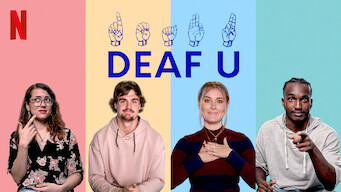A week ago, “Deaf U” was released on Netflix. A reality docuseries executive produced by Nyle DiMarco — admittedly not one of my favorite people — the show centers around a group of Deaf students at Gallaudet University.

I was sure it would be the next docuseries viral hit. After all, the media loves Nyle and the drama of American Sign Language (ASL). I was nervous to watch, because I knew much of the content would piss me off. But how would I be able to educate people (if needed) without watching? Plus, there are only eight episodes under 20 minutes each, so binging would be easy.
My curiosity won out. I watched, so you don’t have to.
As someone posted on Facebook, “Did I miss something? I watched several episodes of Deaf U. It appeared to be more about sex, partying, drinking, and bullying.”
Nope. That’s the show in a nutshell. It’s a huge missed opportunity to showcase what life is like in a deaf bubble like Gallaudet (the country’s only private university for deaf and hard of hearing students). The concept of Deaf Space, for example, wasn’t really touched upon, other than showing a group of students at a bar rearranging the seating so they could all communicate.
I was relieved to see two cast members who spoke as well as signed. One of them even has a cochlear implant. Ironically, he often interpreted for a classmate when they went out to clubs.
The downsides to being reliant on sign language were shown but may have been too subtle. There were a few scenes of people having to type out their food or drink orders on the phone or write them down on paper.
The bullying that’s so prevalent in the show is real when it comes to Deaf Culture. “Elite” Deaf people, who come from Deaf families and are native signers, treat anyone else as less than. It was surprising that people like Cheyenna weren’t aware of this. Did she not do her due diligence?
Gallaudet is so small, it’s practically incestuous. Gossip is a huge problem there. Everyone on the show is majorly f**ked up. Make of that what you will.
While it’s great that there’s a university that exists for people who are Deaf, is it to their detriment? I’ll never forget how one of my middle school teachers assumed I was going to Gallaudet, despite the fact that I was mainstreamed, spoke, and read lips. I was actually insulted. It can be nice to be in a bubble, but it’s not real life.
To further cement this point, people who rely on ASL often have poor English and literacy skills. Gallaudet coddles them. If you don’t believe me, take a look at some statistics a friend unearthed. Only 20 percent of the 2010 cohort finished their Bachelors in four years; 46 percent did it in eight. Two years later, the graduation rate was still low at 47 percent. It dipped again in 2014, with only 19 percent graduating in four years and 44 percent in six years.
But back to the show. There’s no closure in the last episode; I had to go online to find out updates. Then I had some fun looking up reactions on Twitter. I’m not the only one unimpressed. One main complaint from people in the Deaf community is the lack of Black Deaf female representation. I also discovered that the show was supposedly filmed in a month. It shows. If you haven’t already guessed, this hasn’t become a viral hit like I feared.
Nyle is on record as saying he made “Deaf U” to prove that Deaf Culture exists, because “people don’t believe me.” Is it wrong that I’m kind of glad he’s experiencing some backlash? He also says he’s trying to show that there’s “no one right way to be deaf.” But his actions don’t follow.
His next Netflix project, “Audible,” follows a Deaf boy at his alma mater high school – Maryland School for the Deaf. As Nyle describes this Netflix docuseries, “It’s a really interesting opportunity to see what it’s like for a deaf kid to go to a deaf school and play football with all of his buddies, then go home and not have access to language. His parents don’t sign. And that truly is the authentic story of the deaf community in America.”
As a hearing parent of a deaf child posted on Facebook, “[‘Audible’ is] absolutely the experience of many kids who go to signing Deaf boarding schools, but it risks further misrepresenting the statistics for parents who don’t sign by implying that most can’t communicate with their child rather than admitting that many don’t need to sign because their children listen and speak proficiently.”
In fact, more than 90 percent of deaf children are born to hearing parents. Why wouldn’t they want them to (literally) speak their language and be able to function independently in society? We exist. And we don’t need “Deaf U” to prove it.
